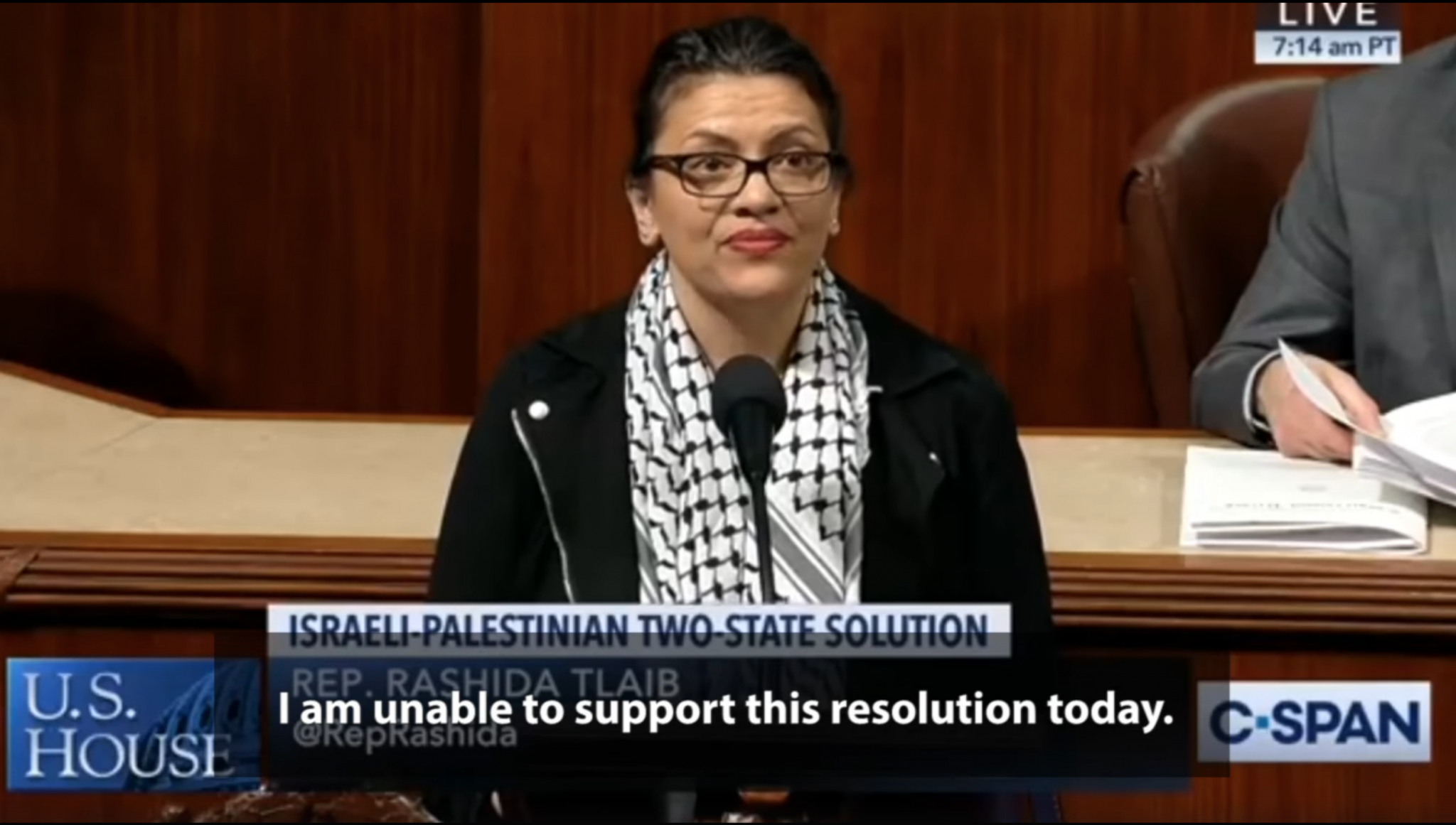An executive order signed by U.S. President Donald Trump on Wednesday, which effectively allows Palestine activism to be targeted as discriminatory toward Jews under the Civil Rights Act, alarmed many observers for its potential to threaten free speech around Israel. Yet the order is only the latest legal development this month to threaten the rights of Palestinians and their allies abroad.
The National Assembly, France’s lower house of parliament, agreed on Dec. 3 (by 154 votes to 72) to adopt the working definition of anti-Semitism put forward by the International Holocaust Remembrance Alliance (IHRA). Three days later, the U.S. House of Representatives approved H.R. 326 (226 votes to 188, with 2 present), a bill that commits to promoting the two-state solution and reviving previous U.S.-led peace efforts in the region.
The two resolutions, which appear to be unrelated at first glance, have ostensibly good intentions. With anti-Semitic attacks sharply rising in France and across Europe, the National Assembly has turned to the IHRA definition to help institutionalize its fight against racism toward Jews. In Washington, Congressional representatives hoped to offset the Trump administration’s open backing of Israel’s settler policies by re-centering what they regard as a fairer solution to the conflict.
Both bills, however, are cause for serious concern. Since its release in 2016, the IHRA definition has been heavily criticized for including various criticisms of Israel as examples of anti-Semitic acts (six of its 11 examples explicitly relate to Israel). The National Assembly even emphasized in its resolution that “Criticizing the very existence of Israel as a collective of Jewish citizens is tantamount to hatred of the Jewish community as a whole … Such abuses increasingly make anti-Zionism ‘one of the contemporary forms of anti-Semitism.’” Israeli officials, including Strategic Affairs Minister Gilad Erdan and Blue and White head Benny Gantz, praised the decision.
The resolution insists that this position does not inhibit the right to criticize Israeli government policies — but that’s precisely what it does. It portrays the Israeli state and the Jewish diaspora as a homogenous unit, inferring that any criticism of the former must be viewed first and foremost with suspicion if not hostility. It views Zionism as the only legitimate framework for exercising Jewish self-determination, while ignoring the dissenting views of anti-Zionist and non-Zionist Israelis and Jews worldwide. And it dismisses the right of Palestinians — those who are citizens of Israel, for starters — to question why the state should privilege Jewish citizens instead of enshrining equal rights for all.
H.R. 326, meanwhile, reflects the classic bias embedded in U.S. policy toward the region. For example, one of its preambles claims that “for more than 20 years, Presidents of the United States from both political parties and Israeli Prime Ministers have supported reaching a two-state solution” (emphasis mine). Not only did Congress willfully ignore that Netanyahu, Israel’s leader for the past decade, has done everything possible to thwart a Palestinian state, it didn’t even bother to mention the Palestinian Authority — the only actor that has actually worked to have that state recognized, albeit imprudently and futilely — as a partner in the project.

Moreover, despite paying lip service to Palestinian self-determination, half of the resolution’s preambles were spent regurgitating the United States’s “unwavering” support for Israel (without mentioning the word “occupation” once). A late amendment to the text even reiterated America’s “ironclad commitments” to the 2016 Memorandum of Understanding, signed by President Obama, which grants Israel $3.8 billion in military funds per year from 2019 to 2028. The line was a clear response to the growing debate within the Democratic party around conditioning funds to Israel: rather than question their complicity in the status quo, the House affirmed that they would maintain it.
While these resolutions do not yet carry substantial policy weight, they do have very troubling implications for Palestinian rights activism.
First, they reassure Israel that its foreign allies will not act to prevent its annexationist ambitions or its worsening oppression of Palestinians; if anything, they will eagerly protect Israel’s impunity. The French resolution does this by undermining opposition to Israel’s policies, and dismissing any critique of Israel’s ideological foundations, as being motivated by malice instead of human rights. The American resolution also helps Israel by keeping legislators detached from the realities on the ground, preserving the myth that the two-state solution is still viable and that Israeli leaders are interested in achieving it.
Second, the resolutions deliver a chilling message that, as far as the French and American governments are concerned, Palestinians are not entitled to political agency as a people fighting for justice and human rights. The first resolution essentially labels Palestinians as inherent anti-Semites for daring to call out the devastating harms that Zionism has wrought on them. The second resolution, which brazenly portrays the U.S. and Israel as partners on the same side of the negotiating table, treats Palestinians simply as the “other” party to be dealt with, rather than as a nation that deserves freedom and respect.
Taken together, the two resolutions illustrate the extent to which Israel is trying to strip Palestinians of their humanity in the eyes of foreign governments — and sadly, those governments appear happy to amplify this agenda on Israel’s behalf. Trump’s new executive order, the latest in a rising wave of anti-BDS and anti-Palestinian measures worldwide, portends more of these dangerous moves to come.
And yet, even in the face of these harrowing attacks, there is still resistance. A public letter to the French parliament signed by 129 Jewish and Israeli academics rejected its conflation of anti-Zionism with anti-Semitism. Congresswoman Rashida Tlaib, joined by the rest of “the Squad” in opposition to H.R. 326, delivered a stirring speech on the House floor while wearing a keffiyah, the traditional Palestinian scarf. A new policy platform, “Freedom is the Future,” is rallying Palestinian voices in the run-up to the 2020 elections. The pressures from the top may be intensifying, but so too is the fight from the bottom.


